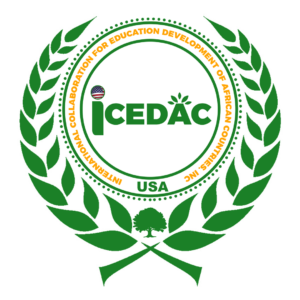14 – QUALITY EDUCATION
Quality education is essential for the personal and professional development of individuals,as well as for the economic and social growth of countries.it can help reduce poverty,improve health and well-being,promote gender equality,strengthen peace and security,and protect the environment.
Quality education can be defined as education that meets the needs of learners by providing them with the knowledge,skills,attitudes and values necessary for their personal and professional development.It must be inclusive,equitable and relevant to all learners,regardless of age,gender,ethnicity or socio-economic status.It must also be delivered by qualified and motivated teachers,in safe and stimulating learning environments.
Why would ICEDAC USA want to promote quality education for all?
- It can help improve the lives of individuals and communities.
- Quality education can help reduce poverty, promote gender equality, strengthen peace and security, and protect the environment.
- It can also help individuals acquire the skills and knowledge they need to succeed in their professional and personal lives.
How can it help?
- To promote quality education, it is important to put in place educational policies and programs that are inclusive, equitable and relevant to all learners, whatever their age, gender, ethnic origin or socio-economic status.
- It is also important to provide teachers with training and resources to help them deliver quality education.
- It is also imperative to create safe and stimulating learning environments for learners.
EDUCATION PIRACY
Educational hacking is a form of cybercrime aimed at compromising the security of computer systems used in educational institutions. This can include breaching the confidentiality of student and teacher data, falsifying academic documents, stealing intellectual property and disrupting computer systems used for teaching.
Educational piracy is a growing problem worldwide, particularly with the rise of e-learning and the use of information and communication technologies in education, which is why it is important to take appropriate security measures to protect computer systems used in education and guarantee data confidentiality and integrity.
Why is ICEDAC USA committed to fighting educational piracy?
First of all, piracy can compromise the security of computer systems used in educational institutions, which can lead to the violation of student and teacher confidentiality, the falsification of academic documents, the theft of intellectual property and the disruption of computer systems used for teaching.In addition, education hacking can have a negative impact on the quality of teaching and learning, by disrupting online courses, corrupting academic data and compromising grading systems. It can also affect the reputation of educational institutions and damage the confidence of students and teachers in information and communication technologies.
Finally, the fight against education piracy is important to protect the intellectual property rights of educational content creators and to ensure that educational institutions comply with intellectual property laws and regulations.
How does ICEDAC USA intend to do this?
By using security software: Educational institutions must use security software to protect their computer systems against piracy threats. Security software can include firewalls, anti-virus, anti-spyware and anti-malware.Raising awareness among students and teachers: educational establishments should make students and teachers aware of the risks of hacking, and inform them of the security measures they need to take to protect their data.
Using strong passwords: educational establishments should encourage students and teachers to use strong passwords to protect their accounts. Passwords should be unique, complex and difficult to guess.
By updating IT systems: educational establishments should regularly update their IT systems to correct security vulnerabilities and protect their data against hacking attacks.
QUALITY EDUCATIONAL PSYCHOLOGY
combining know-how with know-how. Educational psychology is a branch of psychology that studies the cognitive, affective and social processes involved in learning and teaching. It aims to understand how learners learn and develop, and to develop teaching strategies and educational programs that meet learners’ needs. Educational psychology can be used to design educational programs and evaluate their effectiveness, to help teachers understand learners’ needs and adapt their teaching accordingly, and to help learners develop the social and emotional skills that promote their academic success and well-being.
Why does ICEDAC USA focus on quality educational psychology?
Because the learner is our focus.Because quality education is a better resource for learners.
How can we help?
Aware that a contemporary society cannot exist without teachers and learners, ICEDAC USA is committed to participating in the implementation of more effective educational programs that integrate the training of teachers in the field of educational psychology, who in turn will train learners.As education is one of ICEDAC USA’s key areas of focus, the organization is launching a pedagogical program through professional training courses designed to impart knowledge, enhance teachability and develop skills, culminating in international certifications awarded to learners.
